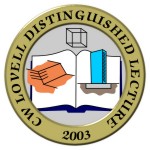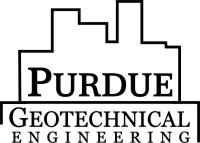
4th C.W. Lovell Distinguished Lecture
| - |
October 31, 2005
Malcolm Bolton
Geotechnical Research in Aid of the Decision-Maker
Although engineering faculty have an obligation to expand the science of their subject discipline, and to inculcate a scholarly approach in their students' work, they also have an obligation to society to consider the degree to which their research work may have a useful impact in engineering practice and thereby on the wider society. One useful impact can be the development of safe, economical and sustainable technologies. Another can come from improved decision-making in engineering design, manufacture, and management – this often flows from improved clarity in the presentation of problems that need to be solved.
Since engineers, like scientists, are concerned with physical realities, it follows that they can best establish clear design and decision-making principles when they have a correct grasp of the underlying physics. This does not imply, however, that their physical thinking should emulate that of a physicist – it needs to be much more focused. The old word for a focused piece of physics is mechanism reflecting Isaac Newton's genius at encapsulating complex phenomena within a defined framework of ideas. Mechanistic approaches to physics lost credibility following Einstein and Heisenberg, who were prepared to fit more abstract mathematical models to fit the exotic data of more demanding observations.
It will be argued that geotechnical researchers have been seduced away from physical mechanisms towards complex mathematical models, but without much hope that fundamental benefits will accrue commensurate with those arising from relativity theory or quantum mechanics. Examples will be given of a variety of instances in which geotechnical decisions can best be taken using simplified mechanisms, or where research needs to be directed towards that goal. These will include the design of sub-sea oil pipeline systems on mud beds, design to limit settlements during construction of spread base foundations on clay, and the management of flow-slide risk in loose fill slopes. The common thread in these applications will be the appropriate use of simple plastic mechanisms calibrated against observations made in the field or in laboratory models, and the relative uselessness of Finite Element Analysis (FEA) and advanced constitutive models.
Nevertheless, poor characterization of soils lies at the heart of many of the most embarrassing blunders in our profession. We need a consistent framework of ideas that encompasses all geomaterials – sand, clay and everything in between. A possible way forward will be suggested, based on an improved understanding of micro-structural mechanisms.
About Malcolm Bolton
| - |
Malcolm Bolton graduated in engineering from Cambridge University in 1967, and also holds an MSc in structural engineering from Manchester University and a PhD in soil mechanics from Cambridge University. He started his academic career as a lecturer at UMIST in 1970 where he took up geotechnical centrifuge model testing, and published his undergraduate textbook "A Guide to Soil Mechanics." He returned to Cambridge in 1980 where he now holds the post of Professor of Soil Mechanics. In 2001 he became the first Director of the Schofield Centre for Geotechnical Process and Construction Modelling.
He has worked on a wide variety of geotechnical research projects including earth retaining walls, slope stability, reinforced soils, deep excavations, tunneling, pile driving, and offshore foundations and pipelines. He has 160 research publications – for details see http://www-civ.eng.cam.ac.uk/geotech_new/geotech.htm.
He has received both the Sir Benjamin Baker Medal and the T K Hsieh Award from the UK Institution of Civil Engineers, and the Oscar Faber Award from the UK Institution of Structural Engineers. He has also been the holder of a Gledden Fellowship from the University of Western Australia and an Erskine Fellowship from the University of Canterbury, New Zealand.
Professor Bolton is a member of the Hong Kong Slope Stability Technical Review Board, and is active as a consultant in offshore geotechnics related to the petroleum industry. He is Chairman of ISSMGE TC35 Geomechanics of Particulate Materials, and is on the Scientific Committee of the Powders and Grains Conference, reflecting a lifelong interest in the fundamentals of granular materials.
Program
| - |
| 12:00 p.m. | Potluck (Bowen Laboratory) |
| 1:30 p.m. |
Panel discussion: Reflections on the past, present and future of geo-engineering research, education and practice (Bowen Laboratory) |
| 4:00 p.m. | Lecture (Fowler Hall, Stewart Center) |
| 6:00 p.m. | Reception and dinner (East Faculty Lounge, Purdue Memorial Union) |
Photos of 4th C.W. Lovell Distinguished Lecture
| - |


